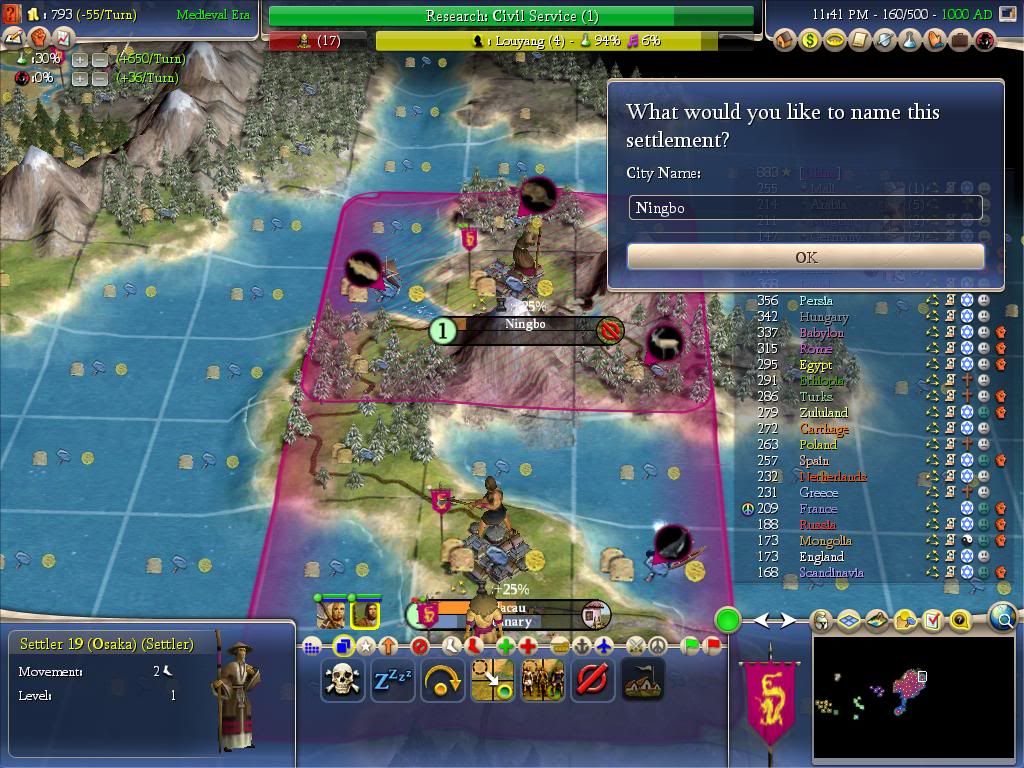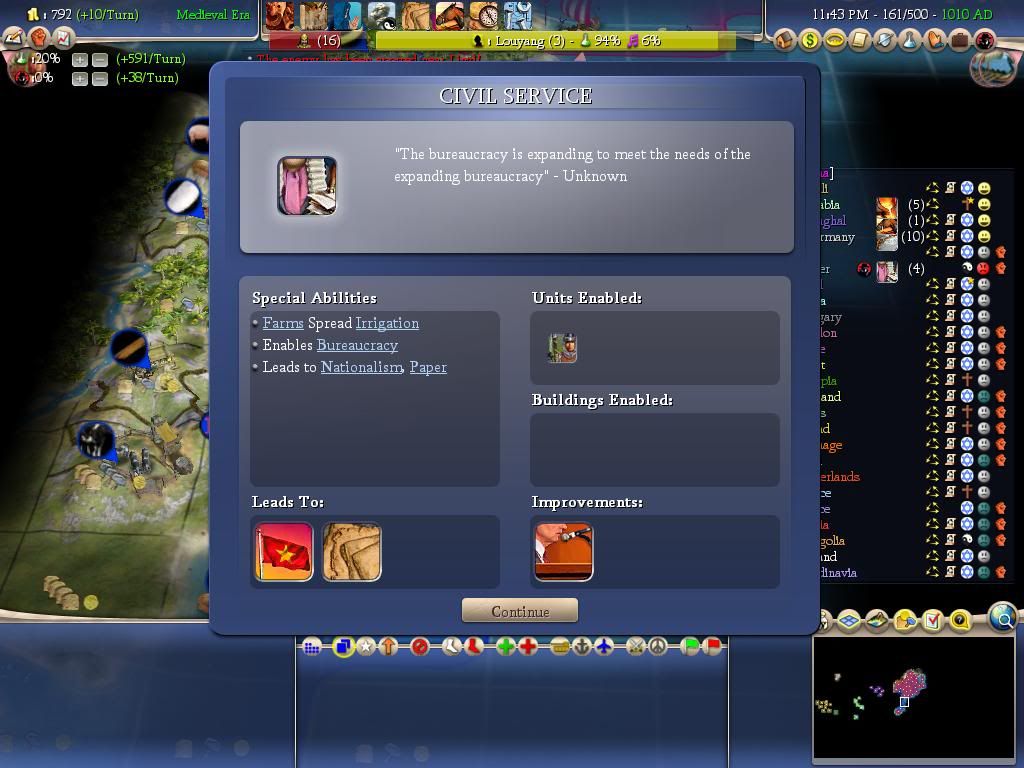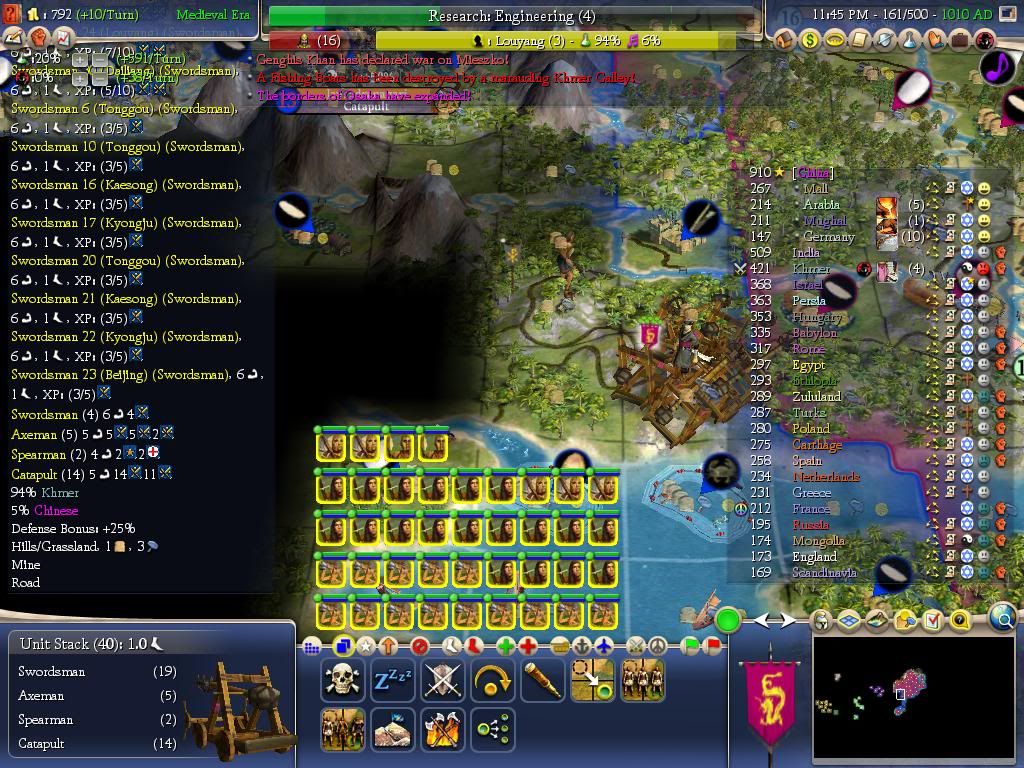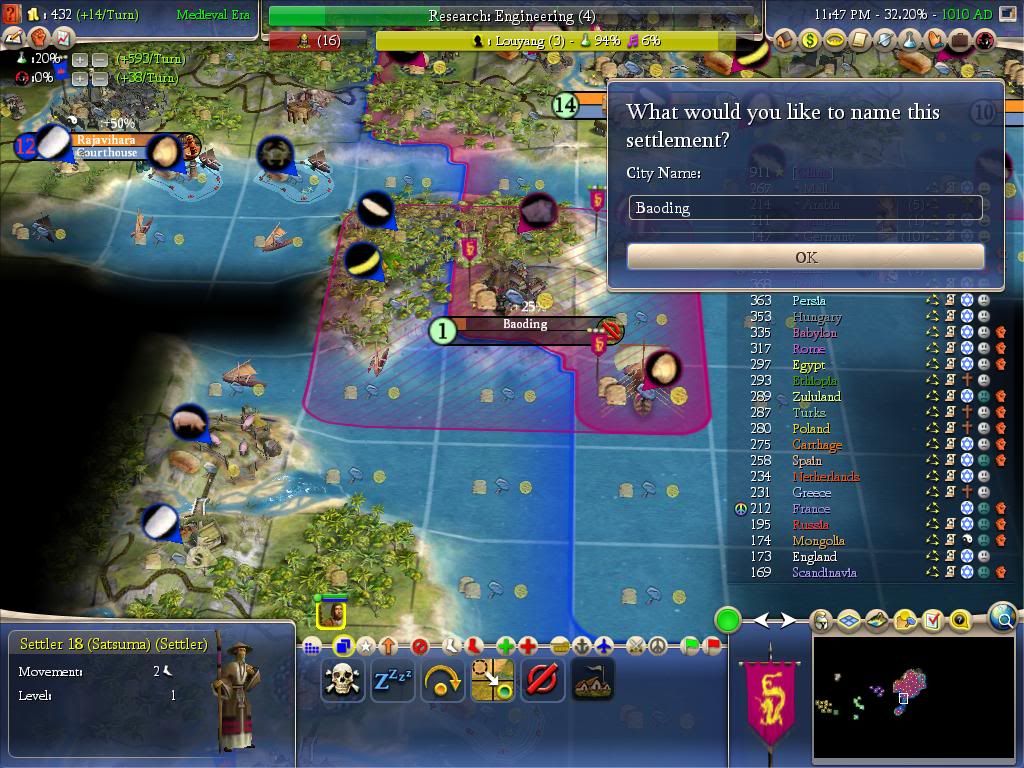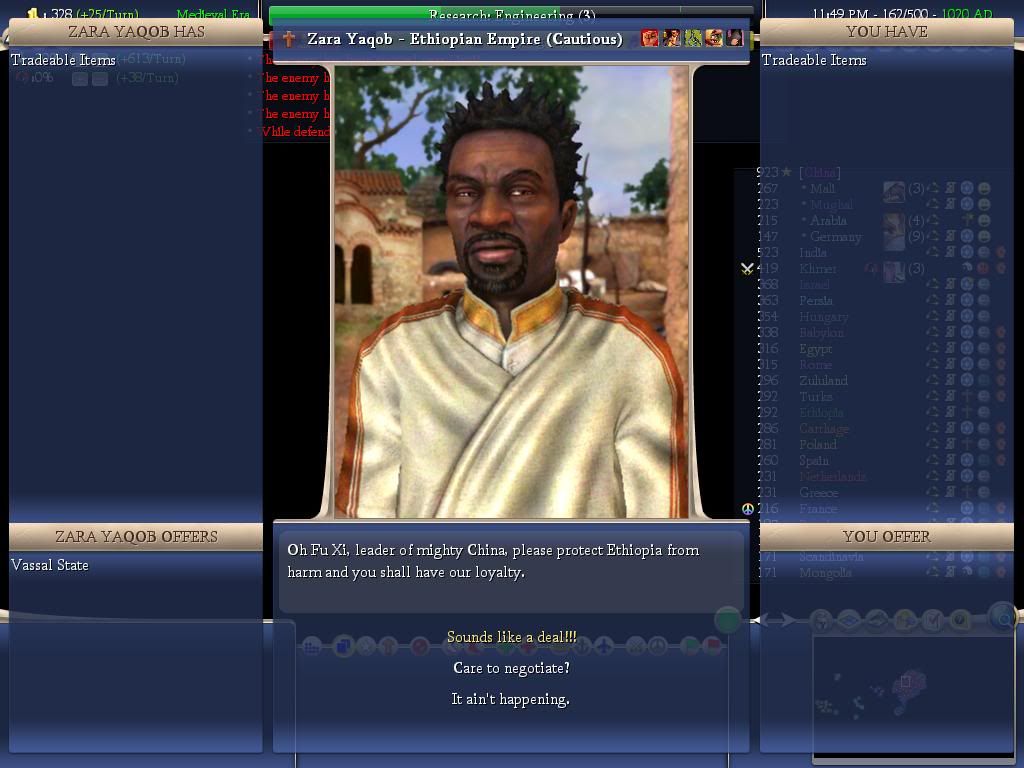Tomorrow's Dawn
Heroes Never Die
The Tōhoku region in the northeast of the Japanese Islands was previously thought to have been inhabited by creatures of supernatural ability and otherworldly beings. Sightings of man-shaped creatures that moved faster than the eye could blink or winged creatures of no discernible avian origin were amongst the most prominent eyewitness accounts of such beings. During Miwa rule, Yamato Emperors had decreed that no one was to venture out north of Osaka into the land of the yokai. Under Xia rule, a new directive was issued publicly in Kyoto and Osaka by Han administrators. Any family that disregarded the myths and built their own homes in the region were allowed to own the land they settled on so long as they claimed it in the name of the Empire. Han settlers rushed towards the region and began staking out land claims for themselves. The more superstitious Yamato locals were slow to compete, as generations of fearful watching into terra incognitae paralyzed them from taking advantage of the opportunity.
The Burakumin however jumped at this chance. Although the Xia Emperors had outlawed the Yamato caste system and eliminated their status as untouchables, their fellow Yamato brethren found loopholes in the re-integration laws in order to continue the old practices of discrimination. It was no big secret that wealthy, influential Yamato families passed around dossiers listing the names of Burakumin clans; blacklisting any from social or career advancement so long as their surname was on that list. The Burakumin, although emancipated, had to find their own solutions to the continued Yamato prejudice. Many young Burakumin women wedded themselves to Han bachelors on the frontier or Han citizens in cosmopolitan Kyoto & Osaka in order to shed their maiden names; most of the men saw no discernible difference between the Burakumin and Yamato or simply disregarded the concept of the untouchables. Other families jumped at the new Tōhoku Rush and moved en masse into the north, eager to leave prejudice and poverty behind in exchange for a new life.
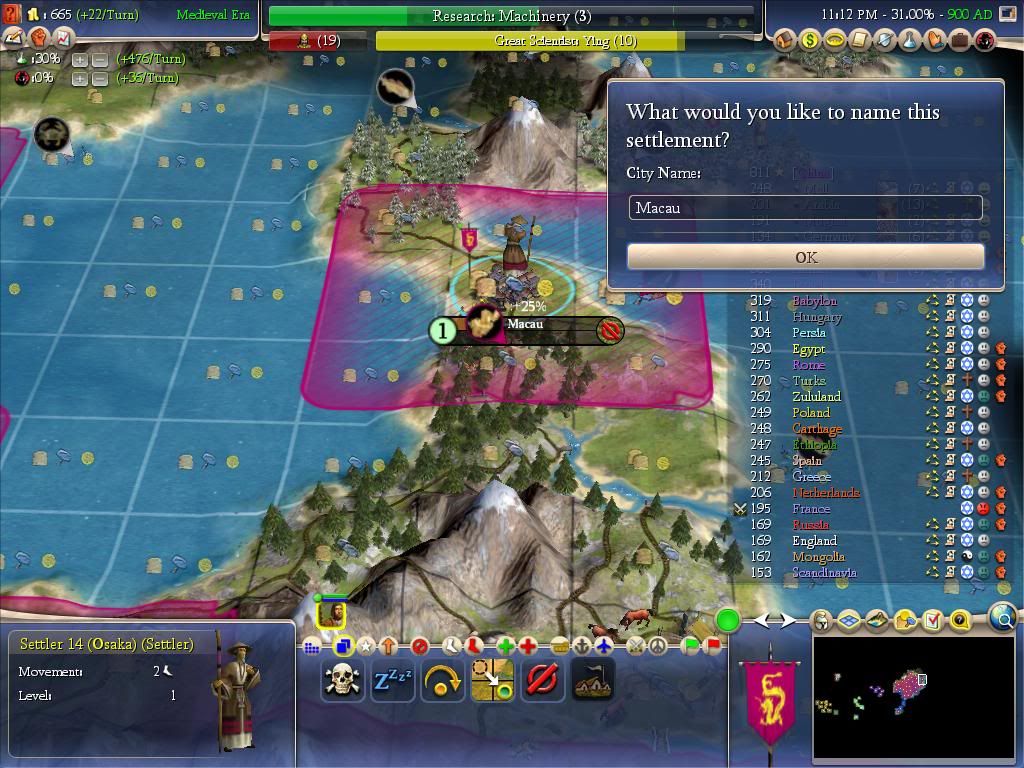
Macau was the first nexus town founded by enterprising Burakumin settlers. By their own initiative, the settlers spent centuries carving out a canal that connected the Sea of Japan to the Pacific. The canal would serve to be invaluable in trade and naval movement in the future.
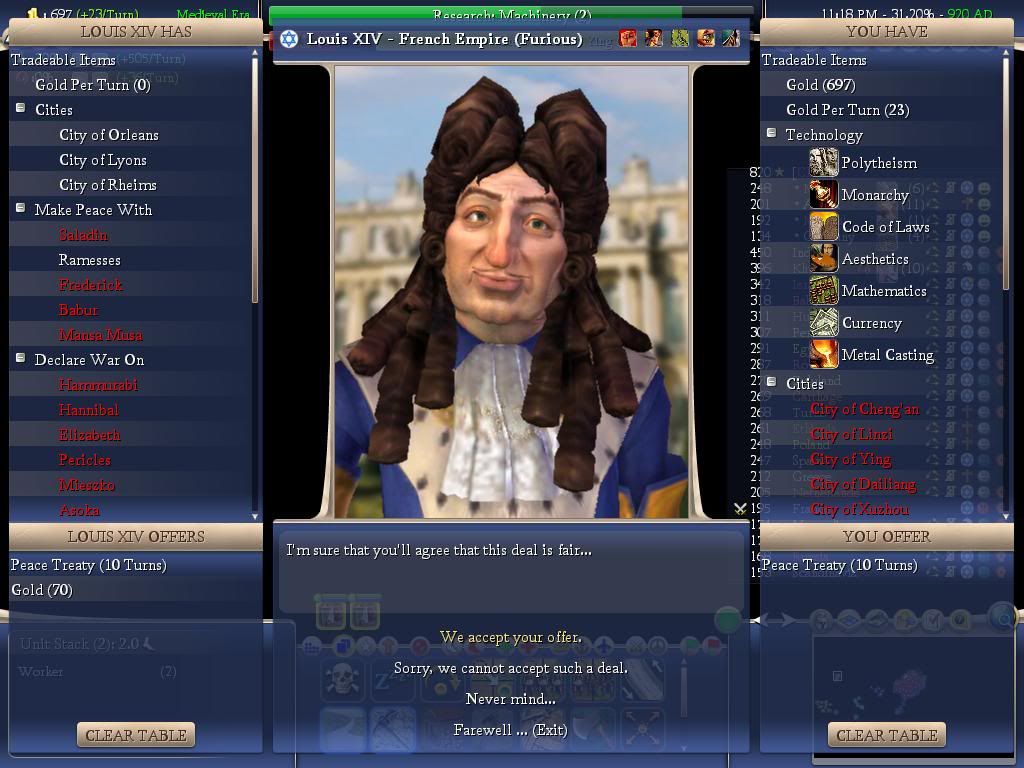
Emperor Xia Pei, son of the Arab princess, Ishraq Alavi & the previous Emperor, Xia Lin II ascended the throne on his fathers deathbed. The first thing the new ruler did was contact his men in Saxony. From his officers in Berlin, the young Emperor negotiated a peace with the Gallians that put an end to the unnerving ceasefire that had been instated years ago when the Han first stepped foot in Saxony. The terms of the Treaty of Berlin however, were humiliating. All the plunder that previous generations of Gallians had stripped away from Saxony had to be returned. Many warrior nobles scrambled to hide away their fortunes but the new King of Gaul would not have the tribute come from his own coffers and confiscated much of their war booty to pay for the tribute. After the treaty, Gaul descended into civil war between the noble coalition & the king's men, with the victorious noble house of Renault forming their own dynasty after the old one had been deposed.
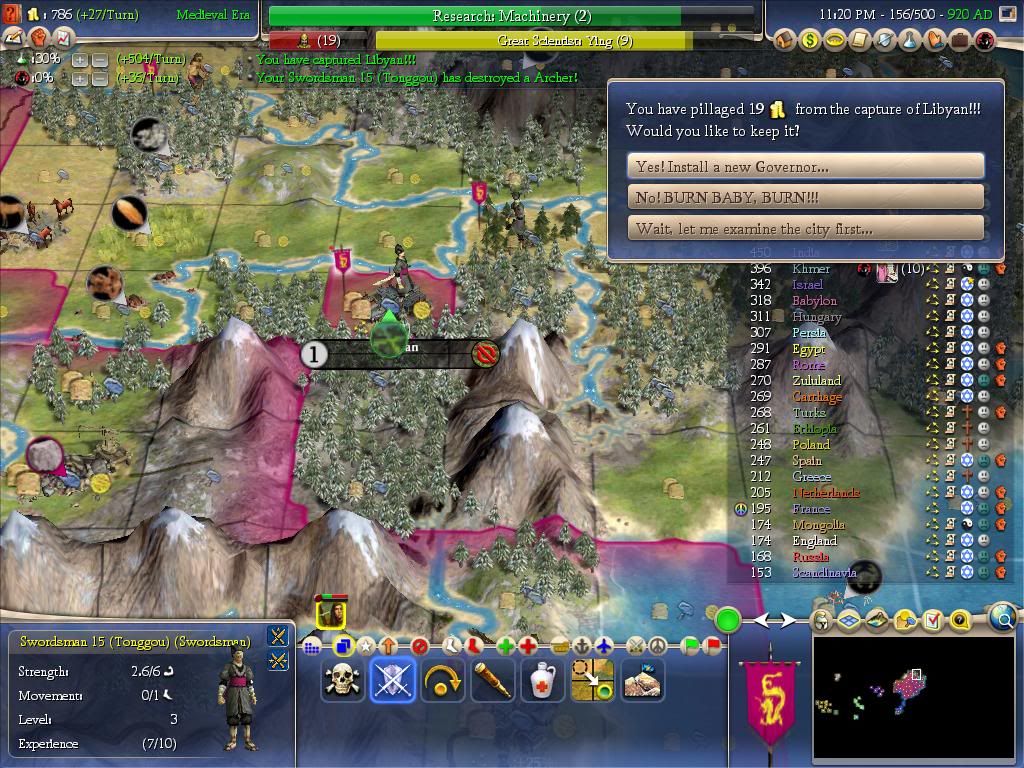
Writers Aside: It went over my head during the last update that I hadn't captured Libyan yet, but just disregard that fact.
Manchu guerilla armies fled into terra incognitae far into the north. This caused an outpouring of Altaic refugees into the border of the Empire, bringing stories and eye-witness accounts of savage Manchurian raiders pillaging, slaughtering & raping everything in sight. Curiously enough, some of them looked just like Saxons to the untrained settler eye. These refugees were brought to Louyang, where the Saxons present in the Chinese court recognized them as Varangians. No nations existed north of the Empire or the Grand Khanate however, let alone any Varangian colonization. Mystery pervaded their presence but at the moment, their well-being was the first priority. The Altaic & Varangian refugees were brought to Chaoxian for resettlement and supervised linguistics research.
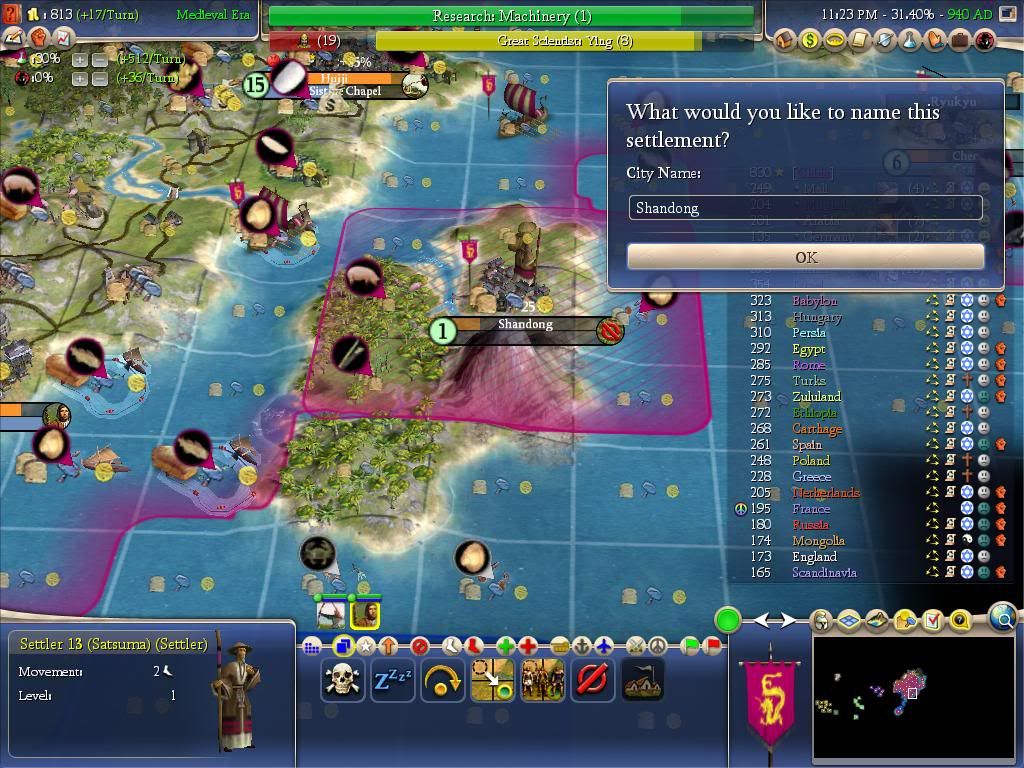
Shandong was established on the island of Taiwan as a joint military and business venture. As a naval base and a thriving port town with ready access to plantation crops all across the island, it was projected to be one of the fastest growing settlements in the whole Empire.
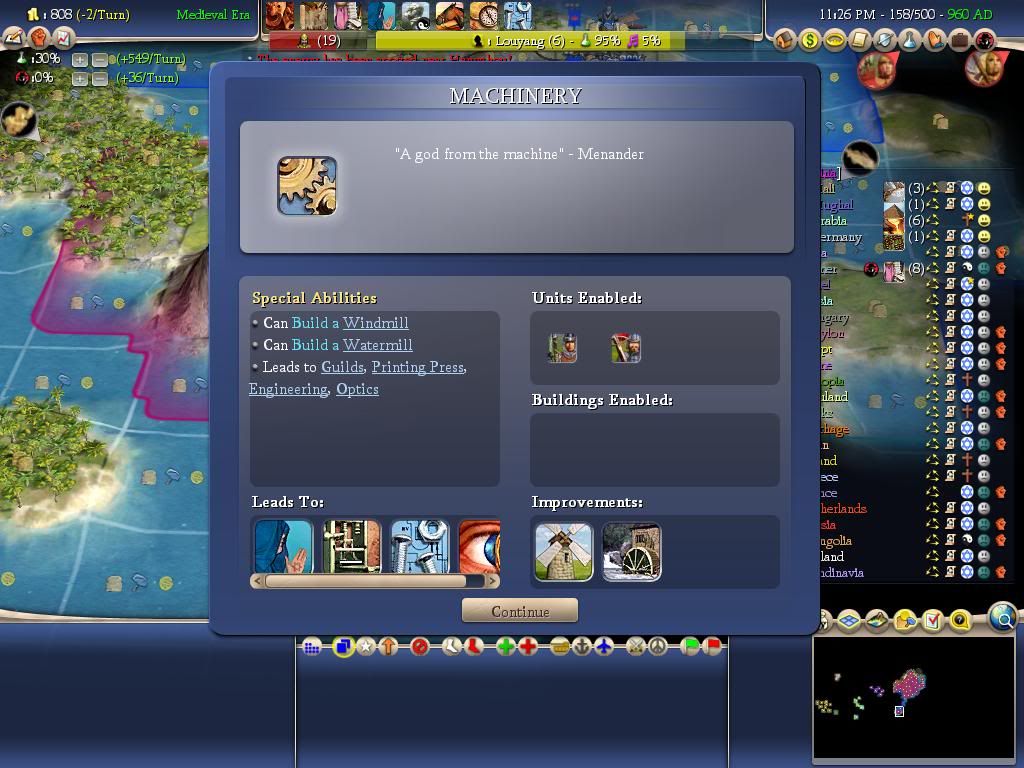
In the same year Shandong was settled, a young inventor from Dailiang named Yu Hai developed a system of iron-based machinery that was set to replace the time-tested wooden mechanisms used across the Empire. Although initially ridiculed by his peers in the great scientific city of Dailiang, they shut up after Yu Hai had received an exclusive contract from the Emperor and the Imperial Chinese Army themselves to develop a new weapon for the Tiger Vanguard based on the principles of his designs. The result was the Cho-Ko-Nu. Yu Hai, using the principles of his machinery design developed a crossbow that only needed a magazine to be inserted and could fire anywhere from ten to fifteen bolts with the time span of fifteen seconds. The mechanism could be fired and reloaded by pulling and pushing a lever mounted on the crossbow back and forth, resulting in a vicious rate of fire and a weapon that required little investment in order to produce a crack troop. The Cho-Ko-Nu would prove to be a popular weapon for the Tiger Vanguard and become the scourge of the Ancient-Medieval world in East Asia as well a symbol of Chinese prestige. This was furthered by the development of a variant that fired all arrows from the shaft instantaneously but required manual deposits of arrows as opposed to loading a magazine.
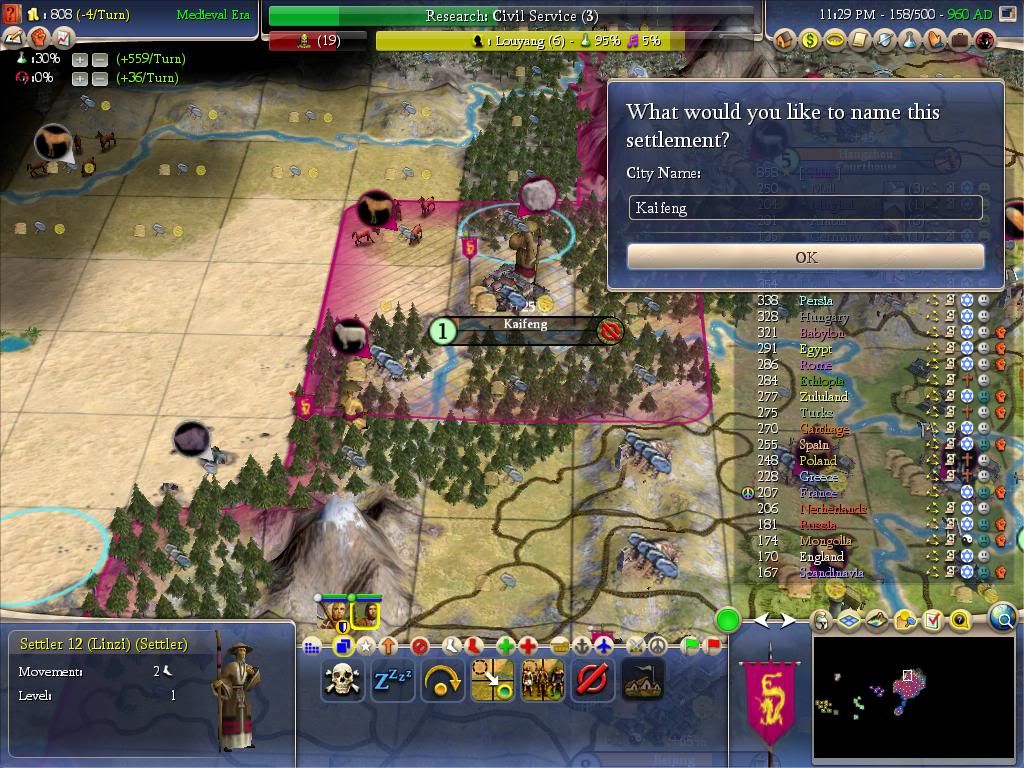
Kaifeng was settled as a military outpost on the western fringe of Manchuria to protect the Empire against a new enemy in the form of Tartar bandits and outlaws who were becoming increasingly frustrated at the lack of plunder within the poor nation of the Grand Khanate itself. They had instead turned towards the rich lands of the Chinese Empire instead, eager to bring civilization to its knees. Kaifeng stood between them and their goal however and many skirmishes between Han border guards and Tartar bandits would occur already within the first year of the outpost's completion.
Prelude
The Kampuchean God-King Ang Rithisak ruled during a time where ethnic tensions were exploding all around his Empire. The landed elite of the Cambodians which comprised little under 2% of the population ruled over a vast majority of poorer Cambodians, Kinh (Vietnamese), Thai, Laotian, Malay & Han peoples. Their overseas ventures in the Philippines were also unpopular with the native Filipinos and reinforced the existing image of the Cambodians being cruel overlords. In particular there was great unrest in the northern areas of the Empire, where there was constant talk and rumor about the northern part of the Empire breaking off and joining the realm of the Xia Emperor. Indeed, there were many defectors who escaped through the north into the Chinese Empire. Ang Rithisak sent an ambassador north to Louyang and demanded that the Xia Emperor return Han and Kinh defectors to the Kampuchean court along with a list of twenty more equally outrageous demands.
To compound onto the already fraught Sino-Kampuchean relations, Cambodians who crossed the border into the Empire were operating an illicit drug trade, devastating the southern Chinese city of Tokyo with drug addiction and rising criminal activity. These smugglers also ran gambling operations on the side, further wrecking Tokyos economy. Another recent development that strained diplomatic relations was Ang Rithisaks outrageous declaration that he had ascended to the status of a god in the Celestial Bureaucracy. It was also rumored that he forcibly took a young Han girl as his bride, whom he declared to be the mortal incarnation of Change, the Lunar Goddess. Leaked testimonies coming from the Palace in Yasodharapura indicated that the maids constantly found her bedsheets covered in blood and that the God-Kings bride was traumatized to the point where she had become mute. At a time when the status of Han women had normalized and redeemed itself, news of this travesty outraged the general public of the Empire and pushed the Li Caste and the faction of Northeastern female bureaucrats to petition for war against Kampuchea.
The young Emperor, at twenty-three years of age, was not about to back down from the increasingly egregious demands and incursions of the arrogant God-King. Xia Pei responded by sending back the Kampuchean ambassador chained to a mule with a soiled rag stuffed into his mouth in response to the God-King's impudence. A raid was also carried out in the drug dens of Tokyo by military personnel, culminating in the arrest and execution of nearly four thousand opium smugglers and casino operators. Their heads were placed on pikes and planted all along the Sino-Kampuchean border to set an example to the Kampuchean God-King; who had been supporting the drug industry behind the scenes in exchange for a portion of the proceeds.
Preparations for the war against Kampuchea had been in place during his fathers reign.
Now was the time to use them. The Empire had suffered enough insolence from the Kampucheans to the south and their punishment was overdue.
Xia Pei swore to the court and his citizens that the rivers of the Mekong would run red with a false gods blood, sparking the initiation of the Sino-Kampuchean War.
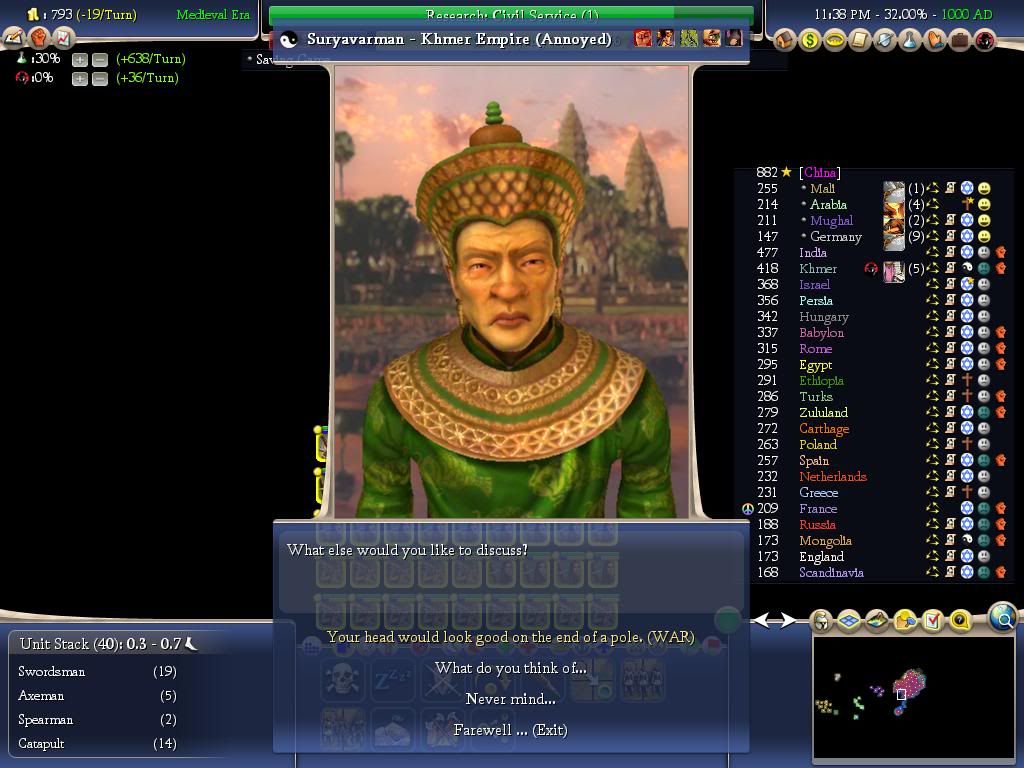
The Burakumin however jumped at this chance. Although the Xia Emperors had outlawed the Yamato caste system and eliminated their status as untouchables, their fellow Yamato brethren found loopholes in the re-integration laws in order to continue the old practices of discrimination. It was no big secret that wealthy, influential Yamato families passed around dossiers listing the names of Burakumin clans; blacklisting any from social or career advancement so long as their surname was on that list. The Burakumin, although emancipated, had to find their own solutions to the continued Yamato prejudice. Many young Burakumin women wedded themselves to Han bachelors on the frontier or Han citizens in cosmopolitan Kyoto & Osaka in order to shed their maiden names; most of the men saw no discernible difference between the Burakumin and Yamato or simply disregarded the concept of the untouchables. Other families jumped at the new Tōhoku Rush and moved en masse into the north, eager to leave prejudice and poverty behind in exchange for a new life.

Macau was the first nexus town founded by enterprising Burakumin settlers. By their own initiative, the settlers spent centuries carving out a canal that connected the Sea of Japan to the Pacific. The canal would serve to be invaluable in trade and naval movement in the future.

Emperor Xia Pei, son of the Arab princess, Ishraq Alavi & the previous Emperor, Xia Lin II ascended the throne on his fathers deathbed. The first thing the new ruler did was contact his men in Saxony. From his officers in Berlin, the young Emperor negotiated a peace with the Gallians that put an end to the unnerving ceasefire that had been instated years ago when the Han first stepped foot in Saxony. The terms of the Treaty of Berlin however, were humiliating. All the plunder that previous generations of Gallians had stripped away from Saxony had to be returned. Many warrior nobles scrambled to hide away their fortunes but the new King of Gaul would not have the tribute come from his own coffers and confiscated much of their war booty to pay for the tribute. After the treaty, Gaul descended into civil war between the noble coalition & the king's men, with the victorious noble house of Renault forming their own dynasty after the old one had been deposed.

Writers Aside: It went over my head during the last update that I hadn't captured Libyan yet, but just disregard that fact.
Manchu guerilla armies fled into terra incognitae far into the north. This caused an outpouring of Altaic refugees into the border of the Empire, bringing stories and eye-witness accounts of savage Manchurian raiders pillaging, slaughtering & raping everything in sight. Curiously enough, some of them looked just like Saxons to the untrained settler eye. These refugees were brought to Louyang, where the Saxons present in the Chinese court recognized them as Varangians. No nations existed north of the Empire or the Grand Khanate however, let alone any Varangian colonization. Mystery pervaded their presence but at the moment, their well-being was the first priority. The Altaic & Varangian refugees were brought to Chaoxian for resettlement and supervised linguistics research.

Shandong was established on the island of Taiwan as a joint military and business venture. As a naval base and a thriving port town with ready access to plantation crops all across the island, it was projected to be one of the fastest growing settlements in the whole Empire.

In the same year Shandong was settled, a young inventor from Dailiang named Yu Hai developed a system of iron-based machinery that was set to replace the time-tested wooden mechanisms used across the Empire. Although initially ridiculed by his peers in the great scientific city of Dailiang, they shut up after Yu Hai had received an exclusive contract from the Emperor and the Imperial Chinese Army themselves to develop a new weapon for the Tiger Vanguard based on the principles of his designs. The result was the Cho-Ko-Nu. Yu Hai, using the principles of his machinery design developed a crossbow that only needed a magazine to be inserted and could fire anywhere from ten to fifteen bolts with the time span of fifteen seconds. The mechanism could be fired and reloaded by pulling and pushing a lever mounted on the crossbow back and forth, resulting in a vicious rate of fire and a weapon that required little investment in order to produce a crack troop. The Cho-Ko-Nu would prove to be a popular weapon for the Tiger Vanguard and become the scourge of the Ancient-Medieval world in East Asia as well a symbol of Chinese prestige. This was furthered by the development of a variant that fired all arrows from the shaft instantaneously but required manual deposits of arrows as opposed to loading a magazine.

Kaifeng was settled as a military outpost on the western fringe of Manchuria to protect the Empire against a new enemy in the form of Tartar bandits and outlaws who were becoming increasingly frustrated at the lack of plunder within the poor nation of the Grand Khanate itself. They had instead turned towards the rich lands of the Chinese Empire instead, eager to bring civilization to its knees. Kaifeng stood between them and their goal however and many skirmishes between Han border guards and Tartar bandits would occur already within the first year of the outpost's completion.
Prelude
The Kampuchean God-King Ang Rithisak ruled during a time where ethnic tensions were exploding all around his Empire. The landed elite of the Cambodians which comprised little under 2% of the population ruled over a vast majority of poorer Cambodians, Kinh (Vietnamese), Thai, Laotian, Malay & Han peoples. Their overseas ventures in the Philippines were also unpopular with the native Filipinos and reinforced the existing image of the Cambodians being cruel overlords. In particular there was great unrest in the northern areas of the Empire, where there was constant talk and rumor about the northern part of the Empire breaking off and joining the realm of the Xia Emperor. Indeed, there were many defectors who escaped through the north into the Chinese Empire. Ang Rithisak sent an ambassador north to Louyang and demanded that the Xia Emperor return Han and Kinh defectors to the Kampuchean court along with a list of twenty more equally outrageous demands.
To compound onto the already fraught Sino-Kampuchean relations, Cambodians who crossed the border into the Empire were operating an illicit drug trade, devastating the southern Chinese city of Tokyo with drug addiction and rising criminal activity. These smugglers also ran gambling operations on the side, further wrecking Tokyos economy. Another recent development that strained diplomatic relations was Ang Rithisaks outrageous declaration that he had ascended to the status of a god in the Celestial Bureaucracy. It was also rumored that he forcibly took a young Han girl as his bride, whom he declared to be the mortal incarnation of Change, the Lunar Goddess. Leaked testimonies coming from the Palace in Yasodharapura indicated that the maids constantly found her bedsheets covered in blood and that the God-Kings bride was traumatized to the point where she had become mute. At a time when the status of Han women had normalized and redeemed itself, news of this travesty outraged the general public of the Empire and pushed the Li Caste and the faction of Northeastern female bureaucrats to petition for war against Kampuchea.
The young Emperor, at twenty-three years of age, was not about to back down from the increasingly egregious demands and incursions of the arrogant God-King. Xia Pei responded by sending back the Kampuchean ambassador chained to a mule with a soiled rag stuffed into his mouth in response to the God-King's impudence. A raid was also carried out in the drug dens of Tokyo by military personnel, culminating in the arrest and execution of nearly four thousand opium smugglers and casino operators. Their heads were placed on pikes and planted all along the Sino-Kampuchean border to set an example to the Kampuchean God-King; who had been supporting the drug industry behind the scenes in exchange for a portion of the proceeds.
Preparations for the war against Kampuchea had been in place during his fathers reign.
Now was the time to use them. The Empire had suffered enough insolence from the Kampucheans to the south and their punishment was overdue.
Xia Pei swore to the court and his citizens that the rivers of the Mekong would run red with a false gods blood, sparking the initiation of the Sino-Kampuchean War.





 I'm still here, i just don't always have something to say
I'm still here, i just don't always have something to say 

